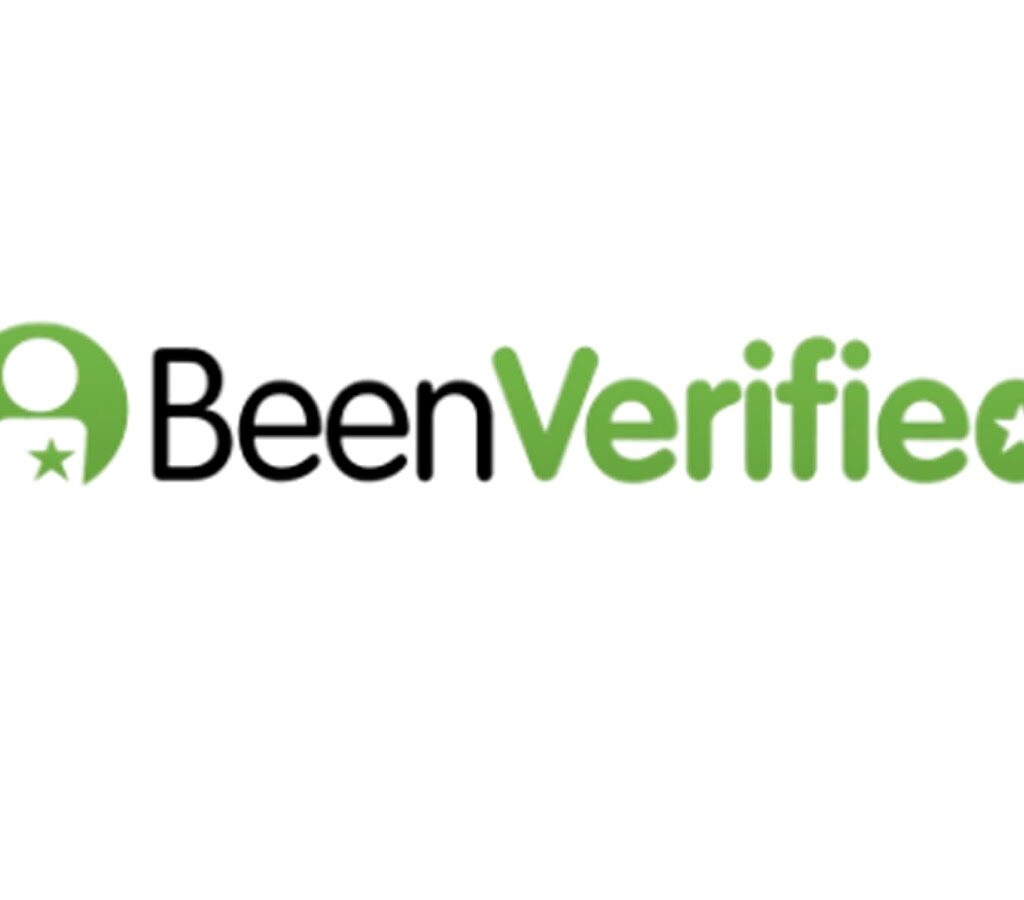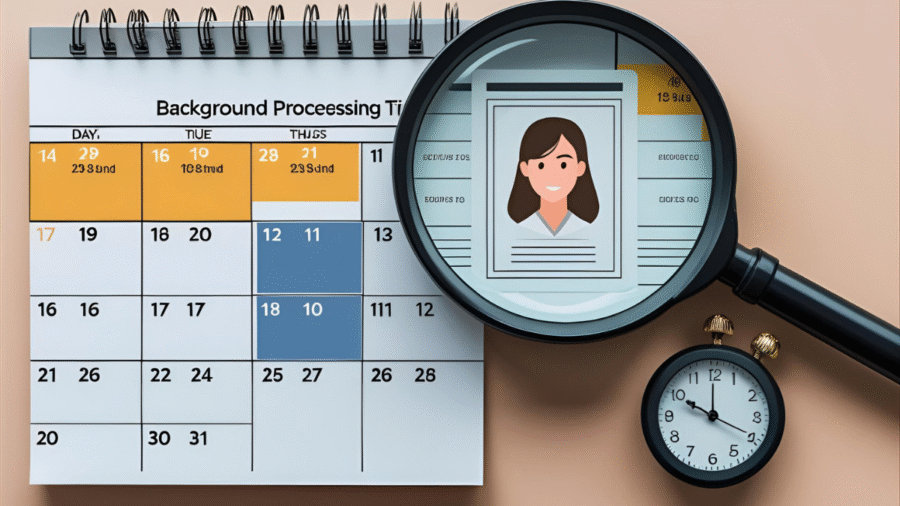The time it takes to complete a criminal record check can vary from just a few minutes to up to five business days, depending on factors such as the complexity of the case, the information needed, and the data sources used.
If you’re wondering how long a typical background check takes or what to do if the process takes longer than expected, keep reading.
How Long Does a Background Check Take?
Background checks come in various forms, each with its own processing time. The speed of completion depends on several factors, such as the type of information requested, the availability of data sources, and any applicable legal regulations.
Depending on the nature of the information an employer requires, a background check can take anywhere from under a minute to up to five business days.
If the process involves manual verification or input from third parties such as licensing boards, educational institutions, or former employers, additional time may be needed.
To better understand the typical turnaround times for different types of background checks, it is advisable to explore further. This can also provide insights into how to access these timelines and identify potential causes for delays.
What Is a Background Check and How Long Should It Take?
Conducting a background check is essential for verifying key aspects of an individual’s history. This process typically involves reviewing criminal records, educational and employment backgrounds, credit history, and, when necessary, administering drug tests.
The main objective of a background check is to confirm a person’s qualifications and assess their reliability. The time required to complete one can vary depending on the type of screening, the depth of the investigation, the accuracy of the information provided, and the organization conducting the check.
While a basic background check may be completed in just a few minutes to a few days, more comprehensive investigations, especially those involving multiple countries, can take several weeks or even months.
The duration can also differ based on the role being filled. For example, positions in regulated fields like healthcare or education often require more extensive screening, which takes additional time.
State or federal regulations may further influence the timeline, as organizations must ensure compliance throughout the process.
Additionally, if further documentation is needed or if the individual has lived in several different locations, the background check may take longer than originally expected.
What Are Turnaround Times for Employment Background Checks?
The length of time required for a background check can vary significantly, from under a minute to up to five business days, depending on the specific details an employer is seeking.
Several factors can extend the process, such as the need for manual record searches or coordination with external sources like licensing boards, educational institutions, or former employers.
Employers often review a candidate’s employment history during the hiring process. Additionally, many organizations now conduct drug screenings and annual criminal background checks to help maintain a secure workplace.
An in-depth employment background check may examine several areas, including job history, academic qualifications, credit reports, driving and criminal records, relevant medical information, social media activity, and drug test results.
These are just some of the elements that might be assessed during the background screening process.
What Are Turnaround Times for Criminal Background Checks?
Depending on the database used, such as the National Crime Database, a criminal history check can often be completed much more quickly than the typical one to three business days.
Many companies now provide instant background checks with guaranteed results in just minutes. These rapid checks rely on readily available online data, which certified background screening services can access through specialized databases.
Standard components of these checks often include national criminal records, sex offender registries, and Social Security number (SSN) traces. The speed and efficiency with which this information is gathered contribute significantly to faster turnaround times for background screenings.
What Are Turnaround Times for Federal Background Checks?
Criminal background checks can encompass a range of additional searches beyond basic records. These may include reviewing sex offender registries, county-level criminal court records, domestic and international terrorism watch lists, and both federal and state government documents.
When manual searches are necessary, accessing these databases may take between one and three days. Federal background checks are typically completed within a single day.
Federal background checks focus specifically on violations of federal criminal law. These may include crimes such as tax evasion, identity theft, interstate drug trafficking, mail fraud, embezzlement, and offenses committed on federal property. The search spans all 94 federal courts across the United States.
While federal checks target nationally prosecuted offenses, many employers opt to review both federal and state criminal and traffic records to gain a more complete picture of a candidate’s background. This is especially crucial for high-level roles, such as C-suite executives, certified public accountants, public sector employees, or any position with access to sensitive financial data.
These checks generally cover the past seven years, though this timeframe may extend further depending on state laws and applicable exceptions.
Turnaround Time for Fingerprint Background Checks
The FBI’s Integrated Automated Fingerprint Identification System (IAFIS) holds a database of over 35 million fingerprint records and is used primarily for conducting fingerprint-based background checks.
If your fingerprints match records in the system, you can typically expect a response within three days. In most employment situations, fingerprinting is just one part of a broader background check process.
Fingerprint background checks are commonly required by government-operated institutions such as public schools, airports, police and fire departments, and hospitals.
If the position involves working with vulnerable populations, like children or the elderly, your prospective employer is especially likely to request a fingerprint background check to ensure safety and trustworthiness.
Delays can occur if your fingerprints are of poor quality or if additional review is needed due to factors such as a prior criminal history.
If this is your first time being fingerprinted, the background check will return no prior matches. Your prints will still be submitted to IAFIS for processing and inclusion in the system.
Other Types of Background Checks and How Long They Take
Identity Verification
The first step in performing a background check is verifying the applicant’s identity. This process confirms the accuracy of the information the applicant provides about who they are.
Different types of identification, including the applicant’s name and Social Security number (SSN), are carefully examined during the verification. SSN tracing is a common method used for this purpose.
Education History
An education history service is used to verify the academic credentials claimed by a job candidate. This process usually includes confirming the degrees earned and the institutions attended. In some cases, grade point averages may also be reviewed.
Licensing Verification
To make sure you hire a qualified candidate, it’s important to verify their licenses and certifications before making an offer.
You should reach out to the relevant licensing agency to confirm the validity, status, and expiration date of the employee’s license.
Employment Verification
Many companies perform background checks to confirm a candidate’s employment history. This usually involves reaching out to the candidate’s former employers by phone.
It’s important to understand that the details gathered during a typical employment verification are quite limited. Most organizations generally confirm only the employment dates and whether the candidate is eligible for rehire.
If you’re looking for a deeper understanding of the applicant’s work experience, it’s helpful to request contact information for three or four references who can offer more detailed feedback on their performance and job history.
Driving Record Checks
When an employee drives for the company, it’s important to verify their driving history by obtaining a motor vehicle record (MVR) report. This report offers details about the driver’s past, including any accidents or traffic violations.
The MVR also provides information about the driver’s license status, such as expiration dates and any suspensions. Additionally, it includes key data regarding the employee’s qualifications to operate a commercial vehicle.
Credit Background Checks
Performing a credit background check enables employers to assess the financial stability and credit history of potential hires. These checks resemble those carried out by lenders or financial institutions, as they rely on information from credit reporting agencies. Small businesses should exercise particular caution when conducting in-depth background investigations.
When a candidate is responsible for handling large sums of money or has access to sensitive business or customer financial data, reviewing their credit history is a wise precaution. This review can offer valuable insights into their financial challenges and their ability to manage money responsibly.
Although background check requirements vary, credit history is subject to stringent scrutiny due to legal regulations.
To comply with the Fair Credit Reporting Act (FCRA), employers must adhere to specific protocols when integrating credit checks into the hiring process. If a credit report influences the decision not to hire a candidate, the employer must follow a defined procedure, which includes obtaining the candidate’s consent via a legally binding authorization form.
It’s also essential to recognize that candidates have the right to dispute any inaccuracies in their credit reports and seek clarification before a final employment decision is made.
Why Is My Background Check Taking So Long?
It’s been two weeks, and there’s still no update on the results of your background check. Don’t worry, there could be a number of reasons for the delay:
- The employer confirms certain information, like your employment history, that appeared inconsistent during the background check.
- There was a delay in receiving the background check from an outside agency.
- While the background check report has now been received, the potential employer still needs to make a hiring decision.
The investigation company might require additional time to gather information from external sources, such as a county courthouse.
If your business needs access to criminal and traffic records in a county without digital records or with limited court staff, expect potential delays beyond the usual timeframe.
Background checks involving many applicants take time and patience. While having a clean background check is beneficial, your hiring decision will ultimately depend on your skills and qualifications.
Additionally, if there are any issues verifying your information or identification documents (like a driver’s license or Social Security card), this will be noted on your profile, and the company may reach out to you for clarification.
To ensure you don’t miss any important background check updates, regularly monitor your email inbox, including your spam or junk folders.
Possible Reasons for a Delay
Several factors can cause a background check to take longer than the usual three to five days to complete.
- The digitization of county court records requires thorough detail, often involving manual searches by county clerks or court runners to ensure accuracy.
- Employers might request a background check if a person has lived, worked, or studied abroad within the past ten years.
- The time needed for international background checks can range from as short as four days to up to twenty days, depending on the cooperation level of the foreign country.
- Delays frequently occur due to incorrect or incomplete background check requests, or missing authorization and release forms required by federal law.
- Individuals who use aliases or have multiple name variations may face longer verification times because of the need for additional manual identity checks.
- Some sources, such as educational institutions or former employers, might require extended periods for verification, resulting in multiple searches conducted by the background check provider.
Best Background Check Sites – Our Top Picks
PeopleFinders – Best Background Check Site Overall
PeopleFinders is a long-standing background check service that specializes in providing fast access to billions of U.S. public records. It’s particularly helpful for verifying someone’s identity or reconnecting with relatives and old friends.
The platform’s reports can include criminal records, court filings, contact details, address history, and information about relatives or associates. It also offers reverse phone and reverse email lookup tools, making it a versatile option for everyday identity verification and safety checks.
With its simple interface and affordable plans, including a $0.95 trial, PeopleFinders is easy to use and accessible for anyone who needs reliable background information.
WhiteBridge – Best for Accurate Reverse Phone Number Lookup Services

WhiteBridge is a trusted platform for those looking to uncover details behind unknown calls quickly and accurately. Their reverse phone number lookup tool allows users to identify callers, verify identities, and even uncover additional background details such as location and possible connections.
The interface is simple yet powerful, making it easy for anyone to navigate without technical knowledge. Whether you’re screening suspicious calls or reconnecting with a long-lost contact, WhiteBridge ensures the information you receive is reliable and up-to-date. With advanced data sources and consistent accuracy, it’s a go-to option for individuals and businesses alike.
Spokeo – Best for Social Media Searches

Spokeo specializes in gathering data from public records and over 60 social networks to help you find people based on their online presence. It’s especially useful for tracking down long-lost friends, identifying unknown numbers, or learning more about someone you’ve met online.
The platform’s detailed reports may include contact details, social media profiles, family members, and location history. Its reverse phone lookup is also highly reliable for spotting spam or scam calls. Spokeo’s interface is beginner-friendly, making it easy for anyone to quickly run a search.
BeenVerified – Best for Comprehensive Public Records Search

BeenVerified offers a well-rounded approach to finding detailed public records, including criminal history, property data, vehicle records, and more. It pulls information from multiple databases, ensuring users get the most complete profile possible.
This makes it ideal for background checks, reconnecting with people, or verifying someone’s identity before important transactions. The mobile app makes on-the-go searches simple, and the reports are clearly organized for easy reading. BeenVerified also updates its data regularly, ensuring the information stays accurate and relevant.
Bottom Line on How Long Does a Background Check Take
The time needed to complete a background check can differ based on how extensive and in-depth it is, as well as the accessibility of the sources being contacted.
While comprehensive background checks might take several weeks or even months, most standard checks are usually completed within a week or less. Although background check services are useful tools, it’s important not to depend on them exclusively for verification.
When making important decisions, like hiring, it’s advisable to perform additional research and exercise thorough due diligence beyond what these reports provide.
All product names, logos, brands, trademarks, and registered trademarks are the property of their respective owners.
DISCLAIMER: You may not use the non-FCRA-approved services mentioned in this article or the information they provide to decide about consumer credit, employment, insurance, tenant screening, or any other purpose that would require FCRA compliance. These services don’t provide consumer reports and are not consumer reporting agencies. (These terms have special meanings under the Fair Credit Reporting Act, 15 USC 1681 et seq., (“FCRA”), which are incorporated herein by reference.)
The information available on our website may not be 100% accurate, complete, or up to date, so do not use it as a substitute for your own due diligence, especially if you have concerns about a person’s criminal history. The services we mention do not make any representation or warranty about the accuracy of the information available through our website or about the character or integrity of the person about whom you inquire. For more information, please review each service’s Terms of Use.



Add a Comment